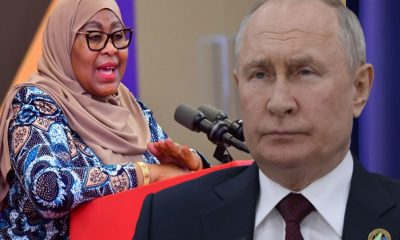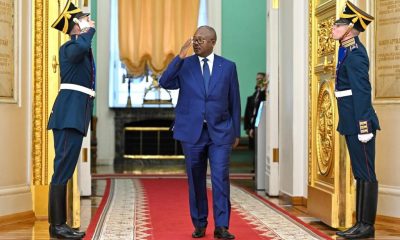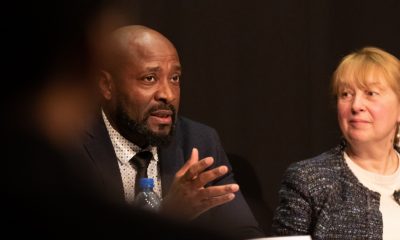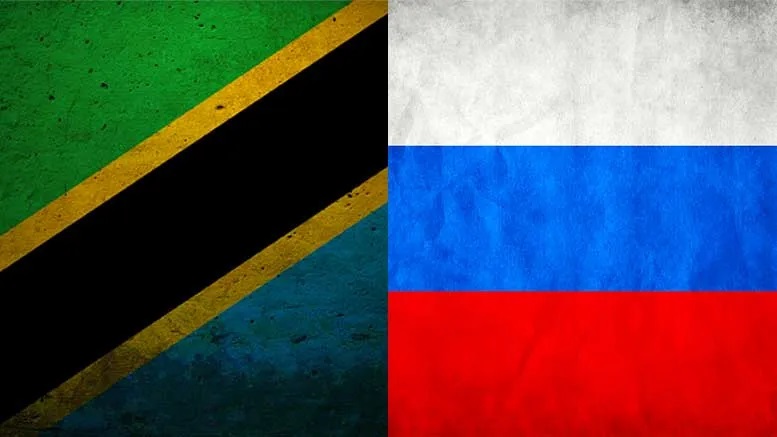World
How is Russia Straddling to Make Economic Impact in Africa
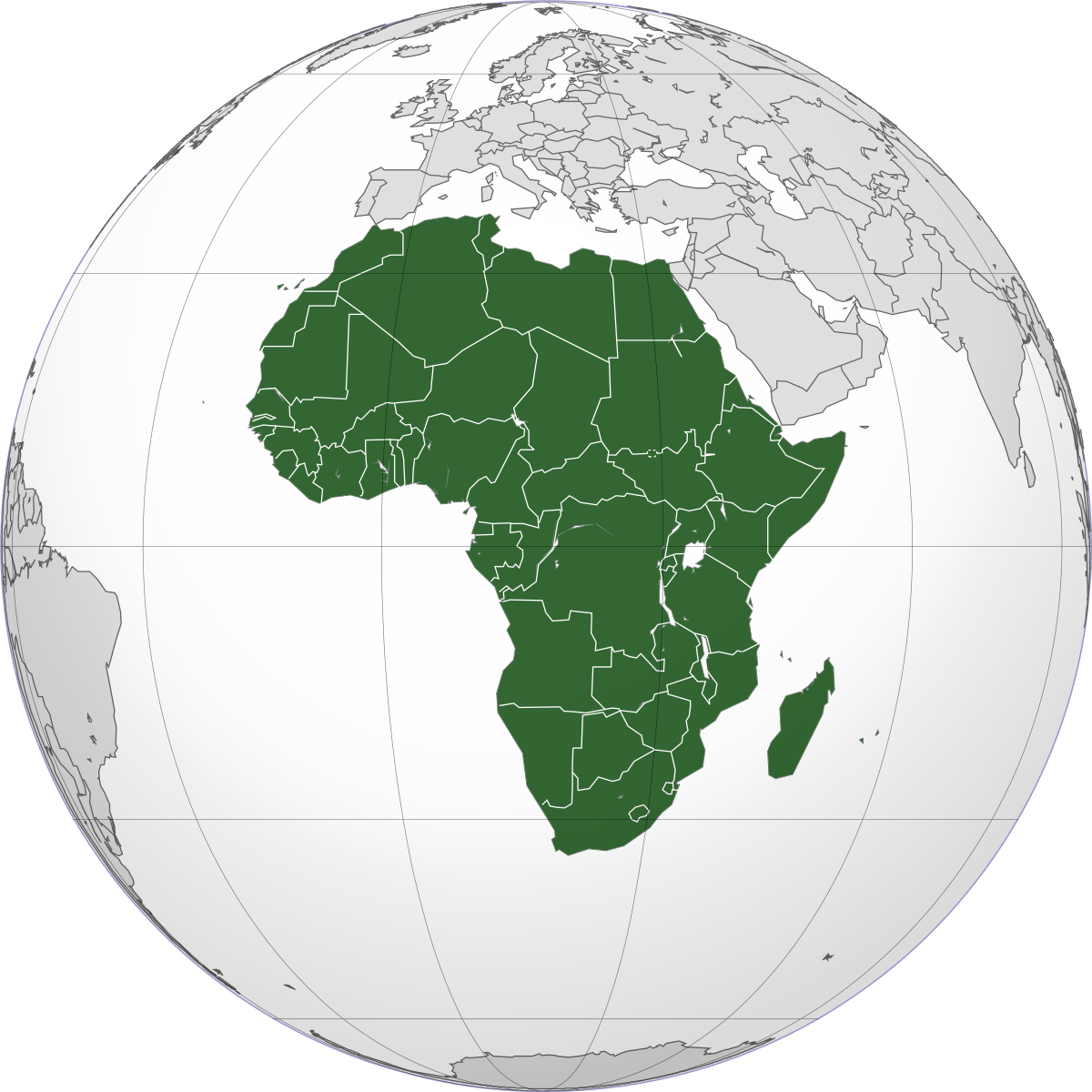
By Kestér Kenn Klomegâh
While Russia’s interest in sub-Saharan Africa is nothing new, Russian authorities have realized that it’s time to move back primarily to reclaim its economic footprints and to find old Soviet-era allies, but that step comes with new challenges, especially from other foreign players and the changing internal political and economic conditions in Africa.
Long before it held its first symbolic summit in October 2019, many experts indicated in several policy reports that “Russia has often failed to capitalize on the historical connection between Moscow and those African elites who had been educated in the Soviet Union and Russia.”
For the past few years, Russian authorities are only demonstrating steady and strategic steps at the possibility of pushing huge investments in lucrative sectors, often rattling in hyperbolic statements on ways to strengthen bilateral relations and expand economic cooperation in a number of African countries.
That theatrical show of corporate investment and business interests has been sealed into various agreements, resulting from high-powered state delegations who frequently visited both regions. Records concretely indicated that 92 bilateral agreements were signed during the first summit; little has been achieved, and yet Russians are looking forward to new agreements in the forthcoming July gathering in St. Petersburg.
Keir Giles, an associate fellow of the Royal Institute of International Affairs (Chatham House) in London, explained to me in an email interview, precisely in April 2015, that “Russia’s approach to Africa is all about making up for a lost time. The Soviet Union’s intense involvement in African nations came to an abrupt halt in the early 1990s, and for a long time, Moscow simply didn’t have the diplomatic and economic resources to pay attention to Africa while Russia was consumed with internal problems.”
According to Giles, “that changed in the last decade, thanks to two things: the arrival of President Vladimir Putin with a new foreign policy focus, and the massive influx of cash on the back of increased oil prices, which transformed Russian state finances. Russia is interested both in economic opportunities and in rebuilding political relationships that had in some ways been on hold for over a decade.”
In order to raise Russia’s economic influence and profile in Africa, the Coordinating Committee on Economic Cooperation with Sub-Saharan Africa, popularly referred to as AfroCom, was created in June 2009 on the initiative of the Russian Federation Chamber of Commerce and Industry and Vnesheconombank to help promote and facilitate Russian business in Africa. Since its creation, it has had full-fledged support from the Russian Government, the Federation Council and State Duma, the Ministry of Foreign Affairs and the African diplomatic community.
At the Chamber of Commerce and Industry of the Russian Federation, Georgi Petrov, noted at AfroCom’s annual executive meeting held in April 2015 that “in view of the current geopolitical situation in the world and the economic situation in Russia, Russian businesses have to look for new markets. In this regard, of particular interest is the African continent, which today is one of the fastest-growing regions in the world with annual GDP growth of 5%. In addition, opportunities for projects in Africa are opened with the accession of South Africa to the BRICS bloc.” Petrov was referring to Brazil, Russia, India, China and South Africa as members of BRICS.
Reports also showed that Russia has started strengthening its economic cooperation by opening trade missions with the responsibility of providing sustainable business services and plans to facilitate import-export trade in a number of African countries. A simple calculation shows that already been more than a decade since the establishment of the Coordinating Committee on Economic Cooperation with Sub-Saharan Africa. There are also several Joint Commissions on Trade and Economic Cooperation, and of course, there are Trade and Economic councillors at nearly all of Russia’s diplomatic missions in Africa.
But these Russian trade centres must necessarily embark on a “Doing Business in Africa” campaign to encourage Russian businesses to take advantage of growing trade and investment opportunities to promote trade fairs and business-to-business matchmaking in key spheres in Africa.
Maxim Matusevich, an associate professor and director of the Russian and East European Studies Program at Seton Hall University, told me in an interview that “in the past decades, there was some revival of economic ties between Africa and Russia – mostly limited to the arms trade and oil/gas exploration and extraction. Russia’s presence in Africa and within African markets continues to be marginal, and I think that Russia has often failed to capitalize on the historical connection between Moscow and those African elites who had been educated in the Soviet Union.”
“It is possible that the ongoing crisis in the relations between Russia and the West will stimulate Russia’s leadership to look for new markets for new sources of agricultural produce. Many African nations possess abundant natural resources and have little interest in Russia’s gas and oil. As it was during the Soviet times, Russia could only offer a few manufactured goods that would successfully compete with Western-made products. African nations will probably continue to acquire Russian-made arms, but otherwise, I see only a few prospects for diversification of cooperation in the near future,” added Maxim Matusevich.
Foreign Minister Sergey Lavrov and the Special Presidential Representative for the Middle East and Africa, Mikhail Bogdanov, have several times paid working visits to Africa. On the other side, they have held several meetings these several years, with several high delegations from Africa. The parties have, these several years, discussed bilateral and regional issues and the improvement of diverse cooperation between Russia and Africa, including cooperation with sub-regional organizations of the continent, according to the several transcripts posted to the official website of the Foreign Ministry.
Without a doubt, Russia’s strategic return to Africa has sparked academic discussions at various levels where academic researchers openly admitted that political consultations are on track, arms export has significantly increased, but other export products are extremely low. In addition, Russia’s involvement in infrastructure development and industry has been invisible for the past decades on the continent.
In another interview, Themba Mhlongo, Head of Programmes at the Southern Africa Trust, thinks that Africa should not expect higher trade flows with Russia simply because Africa has not engaged Russia.
Mhlongo told me that “Russia has not been as aggressive as China in pursuing opportunities in Africa because Russia has natural resources and markets in Eastern Europe, South West Asia. Russian exports to Africa might be dominated by machinery and military equipment which serves their interest well.”
Notwithstanding the above weaknesses, he suggested that Africa must engage all BRICS members equally, including Brazil and Russia, in order to build alliances and open trade opportunities, including finance and investment opportunities. Also, African countries must not seem to show preferences in their foreign policy in favour of Western Europe if they want to benefit from trade relations with Russia. They must learn to be neutral; neutrality is a pragmatic strategy!
Mhlongo suspects that Africa still holds an old view about Russia being a communist state and less technologically developed or unsophisticated than Western Europe. But Russia never colonized Africa, so there are no colonial ties between the two – Africa and Russia.
“If you look at African trade flows to Europe, they reflect colonial ties most of the time. However, modern Russia is now an important emerging market country and a member of BRICS. But Russian society is closed, and its orientation is towards Western Europe, particularly the United States (probably due to the period of bipolar global power system that existed before). Russia exports to Africa but rarely sets up businesses. The language (or culture in general) could be one of the barriers to developing trade relations with Russia,” he underlined in his discussion.
He proposed that both Africa and Russia could initiate a dialogue to explore economic opportunities between them. However, there are other avenues to engage each other through the BRICS bloc or through bilateral diplomatic channels. Russia has embassies in Africa, and African countries have diplomatic representations in Russia. Africa may have to pay special attention to cultural issues, try to understand Russia in this ever-changing environment and find an entry point to engage Russia.
On her part, Alexandra Arkhangelskaya, a senior researcher at the Institute of African Studies under the Russian Academy of Sciences and a staff lecturer at the Moscow High School of Economics, told me in an interview that Russia and Africa needed each other – “Russia is a vast market not only for African minerals but for various other goods and products produced by African countries.”
The signs for Russian-African relations are impressive – declarations of intentions have been made, important bilateral agreements signed – now it remains to be seen how these intentions and agreements will be implemented in practice, she pointed out in her discussions.
The revival of Russia-Africa relations should be enhanced in all fields: political, economic, trade, scientific, technological, and cultural. Obstacles to the broadening of Russian-Africa relations should be addressed. These include, in particular, the lack of knowledge in Russia about the situation in Africa and vice versa, suggested Arkhangelskaya.
“As we witness rapid deterioration of relations between Russia and the West unfold, Russia’s decision to ban the import of some agricultural products from countries that have imposed sanctions against Moscow offers great opportunities for the expansion of trade of such products from Africa,” the professor observed in her discussion.
Experts who have researched Russia’s foreign policy in Africa at the Russian Academy of Sciences’ Institute for African Studies have reiterated that Russia’s exports to Africa can be possible only after the country’s industrial-based experiences a more qualitative change and introduces tariff preferences for trade with African partners. As a reputable institute during the Soviet era, it has played a considerable part in developing African studies in the Russian Federation.
“The situation in Russian-African foreign trade will change for the better if Russian industry undergoes technological modernization, the state provides Russian businessmen systematic and meaningful support, and small and medium businesses receive wider access to foreign economic cooperation with Africa,” according to Professor Aleksei Vasiliev, of the RAS Institute for African Studies and a full member of the Russian Academy of Sciences, and Evgeny Korendyasov, an expert at the RAS Institute for African Studies.
In one of his speeches posted to the official website, Russian Foreign Minister Sergey Lavrov noted frankly in remarks: “it is evident that the significant potential of our economic cooperation is far from being exhausted, and much remains to be done so that Russian and African partners know more about each other’s capacities and needs. Creating a mechanism for providing public support to business interaction between Russian companies and the African continent is still on the agenda.”
World
African Visual Art is Distinguished by Colour Expression, Dynamic Form—Kalalb

By Kestér Kenn Klomegâh
In this insightful interview, Natali Kalalb, founder of NAtali KAlalb Art Gallery, discusses her practical experiences of handling Africa’s contemporary arts, her professional journey into the creative industry and entrepreneurship, and also strategies of building cultural partnership as a foundation for Russian-African bilateral relations. Here are the interview excerpts:
Given your experience working with Africa, particularly in promoting contemporary art, how would you assess its impact on Russian-African relations?
Interestingly, my professional journey in Africa began with the work “Afroprima.” It depicted a dark-skinned ballerina, combining African dance and the Russian academic ballet tradition. This painting became a symbol of cultural synthesis—not opposition, but dialogue.
Contemporary African art is rapidly strengthening its place in the world. By 2017, the market was growing so rapidly that Sotheby launched its first separate African auction, bringing together 100 lots from 60 artists from 14 foreign countries, including Algeria, Ghana, Mali, Nigeria, Senegal, and others. That same year during the Autumn season, Louis Vuitton Foundation in Paris hosted a major exhibition dedicated to African art. According to Artnet, sales of contemporary African artists reached $40 million by 2021, a 434% increase in just two years. Today, Sotheby holds African auctions twice a year, and in October 2023, they raised $2.8 million.
In Russia, this process manifests itself through cultural dialogue: exhibitions, studios, and educational initiatives create a space of trust and mutual respect, shaping the understanding of contemporary African art at the local level.
Do you think geopolitical changes are affecting your professional work? What prompted you to create an African art studio?
The international context certainly influences cultural processes. However, my decision to work with African themes was not situational. I was drawn to the expressiveness of African visual language—colour, rhythm, and plastic energy. This theme is practically not represented systematically and professionally in the Russian art scene.
The creation of the studio was a step toward establishing a sustainable platform for cultural exchange and artistic dialogue, where the works of African artists are perceived as a full-fledged part of the global cultural process, rather than an exotic one.
To what extent does African art influence Russian perceptions?
Contemporary African art is gradually changing the perception of the continent. While previously viewed superficially or stereotypically, today viewers are confronted with the depth of artistic expression and the intellectual and aesthetic level of contemporary artists.
Portraits are particularly impactful: they allow us to see not just an abstract image of a “continent,” but a concrete personality, character, and inner dignity. Global market growth data and regular auctions create additional trust in African contemporary art and contribute to its perception as a mature and valuable movement.
Does African art reflect lifestyle and fashion? How does it differ from Russian art?
African art, in my opinion, is at its peak in everyday culture—textiles, ornamentation, bodily movement, rhythm. It interacts organically with fashion, music, interior design, and the urban environment. The Russian artistic tradition is historically more academic and philosophical. African visual art is distinguished by greater colour expression and dynamic form. Nevertheless, both cultures are united by a profound symbolic and spiritual component.
What feedback do you receive on social media?
Audience reactions are generally constructive and engaging. Viewers ask questions about cultural codes, symbolism, and the choice of subjects. The digital environment allows for a diversity of opinions, but a conscious interest and a willingness to engage in cultural dialogue are emerging.
What are the key challenges and achievements of recent years?
Key challenges:
- Limited expert base on African contemporary art in Russia;
- Need for systematic educational outreach;
- Overcoming the perception of African art as exclusively decorative or ethnic.
Key achievements:
- Building a sustainable audience;
- Implementing exhibition and studio projects;
- Strengthening professional cultural interaction and trust in African
contemporary art as a serious artistic movement.
What are your future prospects in the context of cultural diplomacy?
Looking forward, I see the development of joint exhibitions, educational programs, and creative residencies. Cultural diplomacy is a long-term process based on respect and professionalism. If an artistic image is capable of uniting different cultural traditions in a single visual space, it becomes a tool for mutual understanding.
World
Ukraine Reveals Identities of Nigerians Killed Fighting for Russia

By Adedapo Adesanya
The Ukrainian Defence Intelligence (UDI) has identified two Nigerian men, Mr Hamzat Kazeem Kolawole and Mr Mbah Stephen Udoka, allegedly killed while fighting as Russian mercenaries in the war between the two countries ongoing since February 2022.
The development comes after Russia denied knowledge of Nigerians being recruited to fight on the frontlines.
Earlier this week, the Russian Ambassador to Nigeria, Mr Andrey Podyolyshev, said in Abuja that he was not aware of any government-backed programme to recruit Nigerians to fight in the war in Ukraine.
He said if at all such activity existed, it is not connected with the Russian state.
However, in a statement on Thursday, the Ukrainian Defence released photographs of Nigerians killed while defending Russia.
“In the Luhansk region, military intelligence operatives discovered the bodies of two citizens of the Federal Republic of Nigeria — Hamzat Kazeen Kolawole (03.04.1983) and Mbah Stephen Udoka (07.01.1988),” the statement read.
According to the statement, both men served in the 423rd Guards Motor Rifle Regiment (military unit 91701) of the 4th Guards Kantemirovskaya Tank Division of the armed forces of the Russian Federation.
UDI said that they signed contracts with the Russian Army in the second half of 2025 – the deceased Mr Kolawole on August 29 and Mr Udoka on September 28.
“Udoka received no training whatsoever — just five days later, on October 3, he was assigned to the unit and sent to the temporarily occupied territories of Ukraine,” the report read.
It added that no training records for Mr Kolawole have been preserved; however, it is highly likely that he also received no military training, but his wife and three children remain in Nigeria.
Both Nigerians, the report added, were killed in late November during an attempt to storm Ukrainian positions in the Luhansk region.
“They never engaged in a firefight — the mercenaries were eliminated by a drone strike,” UDI stated, warning foreign citizens against travelling to the Russian Federation or taking up any work on the territory of the “aggressor state”.
“A trip to Russia is a real risk of being forced into a suicide assault unit and, ultimately, rotting in Ukrainian soil,” the statement read.
In an investigation earlier this month, CNN reported that hundreds of African men have been enticed to fight for Russia in Ukraine with the promise of civilian jobs and high salaries. However, the media organisation uncovered that they are being deceived or sent to the front lines with little combat training.
CNN said it reviewed hundreds of chats on messaging apps, military contracts, visas, flights and hotel bookings, as well as gathering first-hand accounts from African fighters in Ukraine, to understand just how Russia entices African men to bolster its ranks.
World
Today’s Generation of Entrepreneurs Value Flexibility, Autonomy—McNeal-Weary

By Kestér Kenn Klomegâh
The Young African Leaders Initiative (YALI) is the United States’ signature step to invest in the next generation of African leaders. Since its establishment in 2010 by Obama administration, YALI has offered diverse opportunities, including academic training in leadership, governance skills, organizational development and entrepreneurship, and has connected with thousands of young leaders across Africa. This United States’ policy collaboration benefits both America and Africa by creating stronger partnerships, enhancing mutual prosperity, and ensuring a more stable environment.
In our conversation, Tonya McNeal-Weary, Managing Director at IBS Global Consulting, Inc., Global Headquarters in Detroit, Michigan, has endeavored to discuss, thoroughly, today’s generation of entrepreneurs and also building partnerships as a foundation for driving positive change and innovation in the global marketplace. Here are the excerpts of her conversation:
How would you describe today’s generation of entrepreneurs?
I would describe today’s generation of entrepreneurs as having a digital-first mindset and a fundamental belief that business success and social impact can coexist. Unlike the entrepreneurs before them, they’ve grown up with the internet as a given, enabling them to build global businesses from their laptops and think beyond geographic constraints from day one. They value flexibility and autonomy, often rejecting traditional corporate ladders in favor of building something meaningful on their own terms, even if it means embracing uncertainty and financial risk that previous generations might have avoided.
And those representing the Young African Leaders Initiative, who attended your webinar presentation late January 2026?
The entrepreneurs representing the Young African Leaders Initiative are redefining entrepreneurship on the continent by leveraging their unique perspectives, cultural heritage, and experiences. Their ability to innovate within local contexts while connecting to global opportunities exemplifies how the new wave of entrepreneurs is not confined by geography or conventional expectations.
What were the main issues that formed your ‘lecture’ with them, Young African Leaders Initiative?
The main issues that formed my lecture for the Young African Leaders Initiative were driven by understanding the importance of building successful partnerships when expanding into the United States or any foreign market. During my lecture, I emphasized that forming strategic alliances can help entrepreneurs navigate unfamiliar business environments, access new resources, and foster long-term growth. By understanding how to establish strong and effective partnerships, emerging leaders can position their businesses for sustainable success in global markets. I also discussed the critical factors that contribute to successful partnerships, such as establishing clear communication channels, aligning on shared goals, and cultivating trust between all parties involved. Entrepreneurs must be proactive in seeking out partners who complement their strengths and fill gaps in expertise or resources. It is equally important to conduct thorough due diligence to ensure that potential collaborators share similar values and ethical standards. Ultimately, the seminar aimed to empower YALI entrepreneurs with practical insights and actionable strategies for forging meaningful connections across borders. Building successful partnerships is not only a pathway to business growth but also a foundation for driving positive change and innovation in the global marketplace.
What makes a ‘leader’ today, particularly, in the context of the emerging global business architecture?
In my opinion, a leader in today’s emerging global business architecture must navigate complexity and ambiguity with a fundamentally different skill set than what was previously required. Where traditional leadership emphasized command-and-control and singular vision, contemporary leaders succeed through adaptive thinking and collaborative influence across decentralized networks. Furthermore, emotional intelligence has evolved from a soft skill to a strategic imperative. Today, the effective modern leader must possess deep cross-cultural intelligence, understanding that global business is no longer about exporting one model worldwide but about genuinely integrating diverse perspectives and adapting to local contexts while maintaining coherent values.
Does multinational culture play in its (leadership) formation?
I believe multinational culture plays a profound and arguably essential role in forming the kind of leadership required in today’s global business environment. Leaders who have lived, worked, or deeply engaged across multiple cultural contexts develop a cognitive flexibility that’s difficult to replicate through reading or training alone. More importantly, multinational exposure tends to dismantle the unconscious certainty that one’s own way of doing things is inherently “normal” or “best.” Leaders shaped in multicultural environments often develop a productive discomfort with absolutes; they become more adept at asking questions, seeking input, and recognizing blind spots. This humility and curiosity become strategic assets when building global teams, entering new markets, or navigating geopolitical complexity. However, it’s worth noting that multinational experience alone doesn’t automatically create great leaders. What matters is the depth and quality of cross-cultural engagement, not just the passport stamps. The formation of global leadership is less about where someone has been and more about whether they’ve developed the capacity to see beyond their own cultural lens and genuinely value differences as a source of insight rather than merely tolerating them as an obstacle to overcome.
In the context of heightening geopolitical situation, and with Africa, what would you say, in terms of, people-to-people interaction?
People-to-people interaction is critically important in the African business context, particularly as geopolitical competition intensifies on the continent. In this crowded and often transactional landscape, the depth and authenticity of human relationships can determine whether a business venture succeeds or fails. I spoke on this during my presentation. When business leaders take the time for face-to-face meetings, invest in understanding local priorities rather than imposing external agendas, and build relationships beyond the immediate transaction, they signal a different kind of partnership. The heightened geopolitical situation actually makes this human dimension more vital, not less. As competition increases and narratives clash about whose model of development is best, the businesses and nations that succeed in Africa will likely be those that invest in relationships characterized by reciprocity, respect, and long-term commitment rather than those pursuing quick wins.
How important is it for creating public perception and approach to today’s business?
Interaction between individuals is crucial for shaping public perception, as it influences views in ways that formal communications cannot. We live in a society where word-of-mouth, community networks, and social trust areincredibly important. As a result, a business leader’s behavior in personal interactions, their respect for local customs, their willingness to listen, and their follow-through on commitments have a far-reaching impact that extends well beyond the immediate meeting. The geopolitical dimension amplifies this importance because African nations now have choices. They’re no longer dependent on any single partner and can compare approaches to business.
From the above discussions, how would you describe global business in relation to Africa? Is it directed at creating diverse import dependency?
While it would be too simplistic to say global business is uniformly directed at creating import dependency, the structural patterns that have emerged often produce exactly that outcome, whether by design or as a consequence of how global capital seeks returns. Global financial institutions and trade agreements have historically encouraged African nations to focus on their “comparative advantages” in primary commodities rather than industrial development. The critical question is whether global business can engage with Africa in ways that build productive capacity, transfer technology, develop local talent, and enable countries to manufacture for themselves and for export—or whether the economic incentives and power irregularities make this structurally unlikely without deliberate policy intervention.
-

 Feature/OPED6 years ago
Feature/OPED6 years agoDavos was Different this year
-
Travel/Tourism10 years ago
Lagos Seals Western Lodge Hotel In Ikorodu
-

 Showbiz3 years ago
Showbiz3 years agoEstranged Lover Releases Videos of Empress Njamah Bathing
-

 Banking8 years ago
Banking8 years agoSort Codes of GTBank Branches in Nigeria
-

 Economy3 years ago
Economy3 years agoSubsidy Removal: CNG at N130 Per Litre Cheaper Than Petrol—IPMAN
-

 Banking3 years ago
Banking3 years agoSort Codes of UBA Branches in Nigeria
-

 Banking3 years ago
Banking3 years agoFirst Bank Announces Planned Downtime
-

 Sports3 years ago
Sports3 years agoHighest Paid Nigerian Footballer – How Much Do Nigerian Footballers Earn


